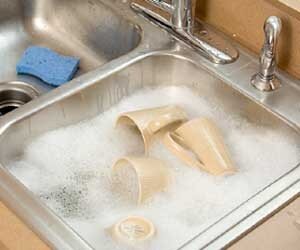Hygiene Hypothesis & Dishwashing
The Hygiene Hypothesis is raised again, this time in regard to sanitized dinnerware.
If you remember, the Hygiene Hypothesis determines that children exposed to innocuous bacteria are less likely to develop allergies; children raised on farms, children who eat foods purchased directly from farms, or eat fermented foods.
 A study released in February now adds dishwashing practices to that list. Parents who wash their dishes by hand, rather than in dishwasher, may also be lowering their children's chances of developing allergies.
A study released in February now adds dishwashing practices to that list. Parents who wash their dishes by hand, rather than in dishwasher, may also be lowering their children's chances of developing allergies.
Following 1,000 young Swedish children, researchers monitored certain parental behaviors like; fed their children foods from farms, such as eggs, meat, unpasteurized milk, fed children fermented foods (probiotic bacteria) and lastly if they washed their dishes by hand or used a dishwasher.
The researchers then recorded if the children had allergies including asthma, eczema and hay fever.
Children in households where dishes were always washed by hand had half the rate of allergies, that rate diminished even more if the children ate fermented foods and foods purchased directly from local farms.
These findings, interesting to discuss are associative, not cause and effect. It is not clear that washing dishes by hand leads to fewer allergies. The Hygiene Hypothesis has been bantered around for a number of years, and the research to identify cause and effect has yet to be established.
The sanitizing effect of dishwashers serves well to reduce germs and bacteria found on dishware. And while this is an interesting finding, it has yet to be confirmed.
If you have questions regarding an allergic condition, I invite you to come in for a consultation. For more on allergy triggers, visit my website http://www.nycallergydoctor.com/ and click on Common Allergies.
